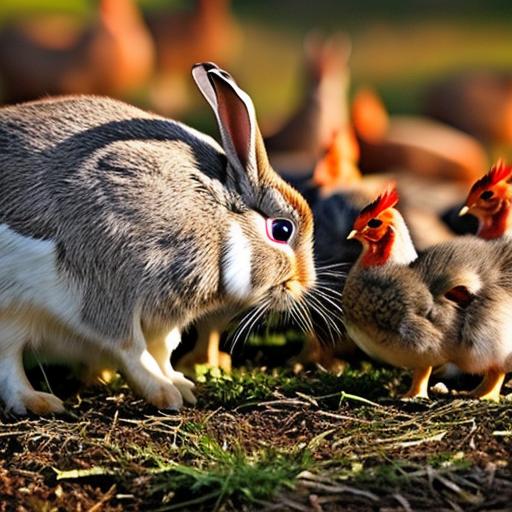Keeping rabbits and chickens together may seem like an unusual combination, but it can actually be a beneficial and rewarding experience. Both animals have their own unique characteristics and needs, but with proper understanding and care, they can coexist harmoniously. As someone who has personally kept rabbits and chickens together, I can attest to the benefits and challenges that come with this arrangement.
Key Takeaways
- Keeping rabbits and chickens together can be mutually beneficial and cost-effective.
- However, there are risks and challenges such as potential health concerns and territorial issues.
- Necessary modifications to the chicken coop must be made to ensure adequate space and ventilation for rabbits.
- Choosing the right rabbit breed and providing appropriate nutrition is important for successful cohabitation.
- Regular cleaning and monitoring for signs of stress or illness is crucial for maintaining the health of both animals.
Understanding Rabbits and Chickens
Rabbits and chickens have different behaviors, diets, and habitats. Rabbits are social animals that thrive in groups, while chickens are more independent and prefer to live in flocks. Rabbits are herbivores and require a diet rich in hay, fresh vegetables, and pellets, while chickens are omnivores and need a balanced diet of grains, seeds, insects, and greens. Rabbits prefer to live in burrows or hutches, while chickens need a coop with roosting bars and nesting boxes.
Despite these differences, rabbits and chickens can be compatible if introduced properly. It is important to gradually introduce rabbits to chickens to prevent any aggression or territorial issues. This can be done by placing the rabbit’s hutch or cage near the chicken coop so they can become familiar with each other’s presence. Supervised interactions can also help them get used to each other’s presence.
Benefits of Keeping Rabbits and Chickens Together
Keeping rabbits and chickens together can have mutual benefits for both animals. Rabbits can help control pests in the chicken coop by eating insects and other small creatures. They also provide companionship for the chickens, as they can interact and socialize with each other. Chickens, on the other hand, can provide warmth for rabbits during colder months by sharing body heat.
Another advantage of keeping rabbits and chickens together is that it is cost-effective and space-saving. By sharing a coop or living area, you can save on housing expenses and utilize space more efficiently. This can be especially beneficial for small-scale farmers or backyard homesteaders who have limited space.
Furthermore, keeping rabbits and chickens together can have environmental benefits. Rabbits produce manure that is rich in nitrogen, which can be used as fertilizer for plants. Chickens also produce manure that can be used as fertilizer, and their scratching behavior helps aerate the soil. This symbiotic relationship between the two animals can contribute to a healthier and more sustainable environment.
Risks and Challenges
While there are many benefits to keeping rabbits and chickens together, there are also risks and challenges that need to be considered. One of the main concerns is the health of both animals. Rabbits are susceptible to certain diseases that can be transmitted by chickens, such as coccidiosis. Chickens, on the other hand, can be carriers of parasites that can affect rabbits.
Aggression and territorial issues can also arise when rabbits and chickens are kept together. Chickens may peck at rabbits or try to establish dominance, which can cause stress and injury to the rabbits. Similarly, rabbits may become territorial and aggressive towards the chickens if they feel threatened or their space is invaded.
To prevent and manage conflicts, it is important to provide separate areas for each animal within the shared living space. This can be done by creating partitions or using different levels in the coop. Providing hiding spots and enrichment activities for both animals can also help reduce stress and prevent aggression.
Preparing Your Chicken Coop
Before introducing rabbits to your chicken coop, it is important to make necessary modifications to ensure their safety and comfort. Rabbits have different housing requirements than chickens, so some adjustments may be needed.
Firstly, make sure there is enough space for both animals to move around comfortably. Rabbits need enough room to hop and stretch their legs, while chickens need space to roost and lay eggs. Adequate ventilation is also important to prevent the buildup of ammonia and ensure good air quality.
Additionally, provide separate areas for rabbits and chickens to eat and drink. Rabbits should have their own food and water bowls to avoid competition with the chickens. This will help ensure that each animal gets the appropriate nutrition they need.
Choosing the Right Rabbit Breed

When keeping rabbits and chickens together, it is important to choose a rabbit breed that is compatible with chickens. Some rabbit breeds are more social and adaptable, making them better suited for cohabitation.
Lop-eared rabbits, such as Holland Lops or Mini Lops, are known for their friendly and sociable nature. They are often recommended for families with children and can easily get along with other animals, including chickens. Lionhead rabbits are another popular breed that can coexist well with chickens due to their calm and gentle temperament.
Personal recommendations and experiences can also be helpful when choosing a rabbit breed for cohabitation. It is important to research different breeds and consult with experienced rabbit owners to find the best fit for your specific situation.
Feeding and Nutrition
Feeding rabbits and chickens together requires careful consideration to ensure that both animals receive a balanced diet without competition for food. Rabbits should have access to unlimited hay, fresh vegetables, and a small amount of pellets. Chickens, on the other hand, need a diet consisting of grains, seeds, insects, and greens.
To avoid competition for food, provide separate feeding areas for rabbits and chickens. This can be done by using different feeders or placing food bowls in different locations within the coop. Monitoring the animals during feeding times can also help ensure that each animal gets their fair share of food.
It is also important to provide a varied diet for both animals to meet their nutritional needs. This can be done by offering different types of vegetables and greens for rabbits, and providing a mix of grains, seeds, and greens for chickens. Consult with a veterinarian or animal nutritionist to ensure that both animals are receiving the appropriate nutrients.
Cleaning and Maintenance
Regular cleaning and maintenance of the coop is essential to ensure the health and well-being of both rabbits and chickens. This includes cleaning out soiled bedding, removing waste, and disinfecting the living area.
Rabbits produce a lot of waste, so it is important to clean their hutch or cage regularly to prevent the buildup of ammonia and bacteria. Chickens also produce waste that needs to be managed properly to prevent the spread of disease. Regularly removing soiled bedding and waste will help maintain a clean and hygienic environment for both animals.
Proper waste management is also important to prevent odors and attract pests. Composting rabbit and chicken manure can be a sustainable way to manage waste and create nutrient-rich fertilizer for plants. It is important to follow proper composting guidelines to ensure that the compost is safe for use.
Monitoring and Observation
Regular monitoring and observation of rabbits and chickens is crucial to detect any signs of stress, illness, or injury. Both animals can be prone to certain health issues, so it is important to be vigilant and proactive in their care.
Signs of stress in rabbits can include decreased appetite, excessive grooming, aggression, or hiding. Chickens may show signs of stress by exhibiting abnormal behavior, such as feather pecking or excessive vocalization. If any of these signs are observed, it is important to address the underlying cause and provide appropriate care.
Injuries can also occur when rabbits and chickens are kept together. Chickens may peck at rabbits, causing wounds or injuries. It is important to separate any injured animals from the group and provide necessary medical care. Regularly checking for injuries and providing a safe environment can help prevent accidents.
Keeping rabbits and chickens together can be a rewarding experience that offers mutual benefits for both animals. With proper understanding, care, and preparation, rabbits and chickens can coexist harmoniously and provide companionship for each other. However, it is important to be aware of the risks and challenges that come with this arrangement and take necessary precautions to ensure the health and well-being of both animals. By following the tips and recommendations outlined in this article, you can create a safe and comfortable environment for your rabbits and chickens to thrive together.
If you’re considering keeping rabbits near chickens, it’s important to understand the compatibility and potential benefits of this arrangement. In a related article on Poultry Wizard, you can learn more about the different factors to consider when cohabitating rabbits and chickens. From managing their feeding habits to ensuring a suitable floor for the chicken coop, this article provides valuable insights into creating a harmonious environment for both animals. To further expand your knowledge on poultry care, you can also explore articles such as “What Should You Feed Ducks?” and “How Many Eggs Do Geese Lay?” on Poultry Wizard’s website.
FAQs
Can I keep rabbits near chickens?
Yes, it is possible to keep rabbits near chickens. However, there are some important considerations to keep in mind.
What are the benefits of keeping rabbits and chickens together?
Keeping rabbits and chickens together can provide several benefits. For example, rabbits can help to control weeds and provide manure for the garden, while chickens can help to control insects and provide eggs.
What are the risks of keeping rabbits and chickens together?
There are some risks associated with keeping rabbits and chickens together. For example, rabbits can carry diseases that can be transmitted to chickens, and chickens can carry diseases that can be transmitted to rabbits. Additionally, rabbits and chickens may compete for food and water.
How can I minimize the risks of keeping rabbits and chickens together?
To minimize the risks of keeping rabbits and chickens together, it is important to keep their living areas separate and clean. Provide separate food and water sources for each animal, and monitor them closely for signs of illness.
What should I consider before keeping rabbits and chickens together?
Before keeping rabbits and chickens together, consider the space you have available, the number of animals you want to keep, and the resources you have to care for them. It is also important to research the specific needs of each animal and ensure that they are compatible with each other.
Meet Walter, the feathered-friend fanatic of Florida! Nestled in the sunshine state, Walter struts through life with his feathered companions, clucking his way to happiness. With a coop that’s fancier than a five-star hotel, he’s the Don Juan of the chicken world. When he’s not teaching his hens to do the cha-cha, you’ll find him in a heated debate with his prized rooster, Sir Clucks-a-Lot. Walter’s poultry passion is no yolk; he’s the sunny-side-up guy you never knew you needed in your flock of friends!







